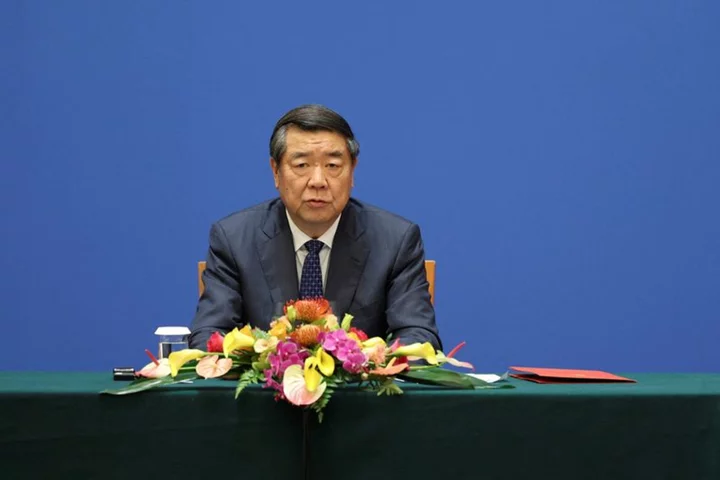By Kevin Yao and Laurie Chen
BEIJING China's new "economic tsar" He Lifeng is emerging as one of President Xi Jinping's most powerful lieutenants, but some sources say he is yet to gain the standing of his predecessor in financial markets and the diplomat community.
He, 68, replaced internationally respected Liu He as one of China's four vice premiers during its annual parliament session in March. The full scope of his portfolio had been largely unclear until Sunday when state media referred to him as the director of a powerful Communist Party economic body.
He is also tipped by China watchers to become the head of the new Central Financial Commission, China's highest ranking financial watchdog, which is being set up to strengthen the Party's control of the country's $61 trillion financial industry.
That puts him in charge with tackling the local government debt crunch and the downturn in the property sector, two crises that economists say threaten to wipe out much of the long-term growth potential in the world's second-largest economy.
He joined Xi on his first known visit to China's central bank last month and is also playing a prominent role in trade talks with Washington and Europe in an increasingly tense geopolitical environment.
"He is very much not in the same league as Liu He," said a diplomat involved in recent trade talks with China, describing him as "tough and uncompromising" and not interacting in English with his interlocutors.
Harvard-trained Liu's influence on policies often overshadowed the largely sidelined former Premier Li Keqiang, who died of a heart attack last week, policy insiders said.
Liu was seen as the brains behind some key early industrial and financial reforms that set China up for some staggering growth rates in recent decades.
By contrast, He is seen as more of a bureaucrat.
"He Lifeng mainly implements policies from the top leader," said a policy adviser who spoke on condition of anonymity, referring to Xi.
LOW-PROFILE
Beijing is unleashing a round of stimulus to shore up the economic recovery but economists warn China could be headed for a long period of very low growth without deep structural reforms and a cleanup of the property sector and local finances.
While Liu often held long speeches and published articles on policy and reform issues, He has kept a relatively low-profile since March.
Investors and economists have grown frustrated with China's lack of concrete policy measures to achieve its goals of boosting domestic consumption and decisively tackling municipal debt problems.
"He is low-profile and cautious, partly because the cabinet's own power has been downgraded under the new structure," said the policy adviser.
Under Xi, the ruling Communist Party has increased its decision-making power on key policy changes, leaving limited room for the State Council, or the cabinet, to set the agenda.
"He used to work in the system of economic planning for a long time and he should be familiar with macroeconomic control especially in the real economy sector," said a second policy adviser who spoke on condition of anonymity.
"Now under the leadership of the Party ... there will be closer cooperation among the top economic planner, central bank and the finance ministry."
A home-groomed economist who studied finance at Xiamen University from 1978 to 1984, He obtained a doctorate in economics in 1998, when he was the party chief of Quanzhou city in Fujian.
He's relationship with Xi dates back four decades. He first worked under Xi in the coastal city of Xiamen and later in the northern municipality of Tianjin.
In the 1980s, He attended the ceremony when Xi married his second wife, the popular singer Peng Liyuan, sources have said.
In 2014, He was named vice chairman of the National Development and Reform Commission, the state planning agency, before taking full control in 2017. Since then He has joined Xi on domestic tours, in diplomatic meetings and in other engagements.
"Due to his close ties and loyalty to Xi, it's easy for him to take policy guidance from the top and implement it," said a third policy adviser. "His obvious shortcoming is that he has not directly managed the financial sector."
(Reporting by Kevin Yao, Laurie Chen, Joe Cash and Ellen Zhang; Editing by Marius Zaharia and Lincoln Feast.)

